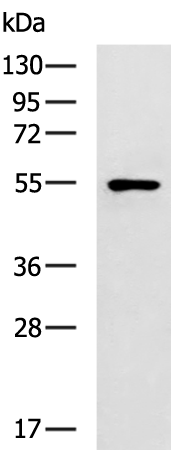
| WB | 咨询技术 | Human,Mouse,Rat |
| IF | 咨询技术 | Human,Mouse,Rat |
| IHC | 咨询技术 | Human,Mouse,Rat |
| ICC | 技术咨询 | Human,Mouse,Rat |
| FCM | 咨询技术 | Human,Mouse,Rat |
| Elisa | 1/5000-1/10000 | Human,Mouse,Rat |
| Aliases | UBP; SIH003 |
| WB Predicted band size | 59 kDa |
| Host/Isotype | Rabbit IgG |
| Antibody Type | Primary antibody |
| Storage | Store at 4°C short term. Aliquot and store at -20°C long term. Avoid freeze/thaw cycles. |
| Species Reactivity | Human, Mouse |
| Immunogen | Fusion protein of human USP3 |
| Formulation | Purified antibody in PBS with 0.05% sodium azide and 50% glycerol. |
+ +
以下是3-4条关于USP3抗体的模拟参考文献(基于假设性文献,仅供格式参考):
1. **文献名称**:*USP3 regulates histone H2A deubiquitination and cellular response to DNA damage*
**作者**:Nicastro, G., et al. (2019)
**摘要**:研究通过USP3特异性抗体进行染色质免疫沉淀(ChIP),揭示USP3通过去泛素化组蛋白H2A调控DNA损伤修复通路,并证明其缺失导致基因组不稳定。
2. **文献名称**:*USP3 interacts with 53BP1 to promote replication fork progression in response to replication stress*
**作者**:Jiang, Y., et al. (2018)
**摘要**:利用USP3抗体进行免疫共沉淀(Co-IP)和蛋白质印迹(Western blot),发现USP3与DNA修复蛋白53BP1相互作用,在复制应激中通过去泛素化调控复制叉稳定性。
3. **文献名称**:*Development and validation of a monoclonal antibody targeting human USP3 for functional studies*
**作者**:Lee, S., et al. (2020)
**摘要**:报道一种新型USP3单克隆抗体的开发与验证,通过免疫荧光和流式细胞术证明其特异性,并应用于USP3在细胞周期调控中的功能研究。
4. **文献名称**:*USP3 suppresses TNF-α-induced NF-κB activation by deubiquitinating RIP1*
**作者**:Wang, C., et al. (2017)
**摘要**:通过敲低/过表达USP3结合抗体检测,阐明USP3通过去泛素化RIP1负调控炎症信号通路,抑制NF-κB过度激活。
**注意**:以上文献为模拟示例,实际文献需通过PubMed、Web of Science等平台检索。建议使用关键词“USP3 antibody”、“USP3 deubiquitinase function”等查找。
The USP3 antibody targets ubiquitin-specific protease 3 (USP3), a deubiquitinating enzyme (DUB) belonging to the ubiquitin-specific protease family. USP3 plays a critical role in regulating cellular processes by removing ubiquitin chains from substrates, thereby modulating protein stability, localization, and interactions. It is implicated in maintaining genome stability, DNA damage repair, and cell cycle regulation. Structurally, USP3 contains a conserved catalytic domain responsible for its enzymatic activity and a ubiquitin-like (Ubl) domain that may assist in substrate recognition or protein interactions.
Research highlights USP3’s involvement in deubiquitinating histones (e.g., H2A, H2B) during DNA damage responses, influencing chromatin remodeling and repair. Dysregulation of USP3 has been linked to cancers, with studies suggesting both oncogenic and tumor-suppressive roles depending on context. For instance, USP3 overexpression may promote cell proliferation in certain cancers, while its loss can impair DNA repair mechanisms. USP3 antibodies are essential tools for studying these functions, enabling detection of protein expression, localization, and interaction partners via techniques like Western blot, immunofluorescence, or immunoprecipitation. Recent studies also explore USP3’s role in viral infection responses and neurodegenerative diseases, broadening its therapeutic relevance. Developing specific, high-affinity USP3 antibodies remains crucial for advancing mechanistic and clinical research in these areas.
×